Do you have a favorite garden flower that always seems to bury its head in the dirt, especially after heavy rains? This flower may be perfect for planting in hanging baskets. Many of the flowers suitable for hanging in baskets are drooping, top-heavy, or prostrate – features that can be a challenge in a garden, but are perfect for decorative displays in containers that are at eye level or higher.
Plants with small or aromatic flowers also benefit from heights, as it maximizes its proximity to our senses. Some hanging baskets even attract butterflies or hummingbirds, allowing you to get an up-close look at wildlife antics on the porch, deck, or patio.
Begonia (Begonia boliviensis)
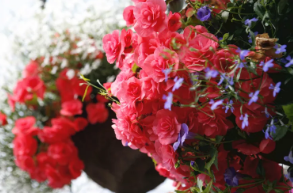
For those who don’t have the right climate to grow fuchsia, begonias can serve as a stand-in for plants. The semi-hardy Bolivian begonia has the same tubular drooping flowers as the upside-down Admiralty, but adapts to the heat and humidity of the southern summer. Other tuber begonias that look great in hanging baskets include the Nonstop Mocca series, which are fully double-petaled, similar to roses.
- USDA Growing Areas: 9 to 11
- Color varieties: yellow, red, pink, white, orange
- Sun exposure: Full sun to partial shade
- Soil requirements: fertile, light, moist, well-drained
Fuchsia
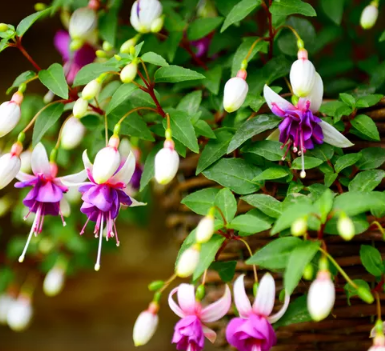
Gardeners who live in cool, wet areas during the summer months can’t afford to miss the opportunity to grow this amazing, shade-loving, tender perennial. Although it is true that these plants are prone to wilting during the summer months, you can look for a more heat-tolerant variety such as “Astoria”, “Jupiter” or “Surprise”. A little fuss can prolong the beauty of the fuchsia in the hanging basket. These plants respond well to daily spraying, regular fertilization, and diligent heading.
- USDA Growing Areas: 10 to 11
- Color varieties: white, pink, red, purple, multicolored
- Sun exposure: Partial sunlight
- Soil requirements: moist, fertile, fertile
Lantana (Lantana camara)
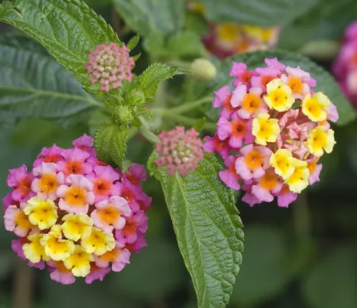
In frost-free areas, ordinary lantana can turn into a mob, grow into wild woody shrubs, climb over fences, and occupy flower beds. However, lantana’s vibrant flower clusters provide a reliable tropical color for the long growing season, attracting butterflies and hummingbirds. Choose a small crying variety for your hanging basket, such as “Patriot Popcorn” or “Patriot Rainbow”. If lantana is too vigorous in your area, choose a sterile variety (such as “Golden Hill” or “Patriot”) that does not grow seed-filled berries.
- USDA Growing Areas: 8 to 11
- Color variety: a combination of red, orange, yellow, white, pink
- Sun exposure: Plenty of sunlight
- Soil requirements: good drainage; Able to tolerate poor soils
Lobelia (Lobelia erinus)
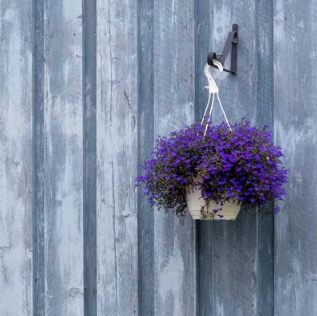
Lobelia is best thought of as a seasonal plant in early spring, as it thrives in moderate temperatures. Your hanging basket will be covered with an abundance of electric blue flowers, with a white throat that contrasts and attracts butterflies. At the end of June, don’t waste time caring for your plants; Replace them with million bells, lantana, or other heat-loving plants.
- USDA Growing Areas: 10 to 11
- Color varieties: purple, blue, red, pink, violet
- Sun exposure: Full sun to partial shade
- Soil requirements: Organic, well-drained, evenly moistened
Million Bells (Calibrachoa; hybrid)
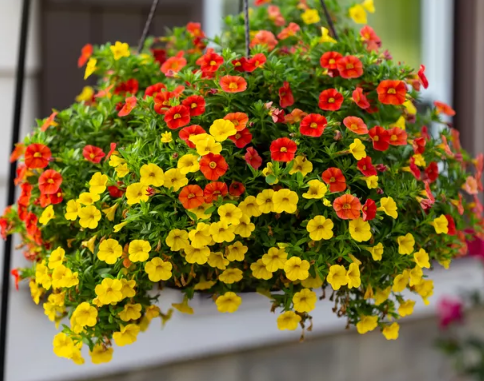
When the temperature rises, the petunias’ close relatives do not wilt. Million bells produce little or no seeds and do not need dead heads to keep flowering. All they need is moist soil and a full day of sunshine to keep your hanging basket alive.
- USDA Growing Areas: 9 to 11
- Color varieties: pink, yellow, red, purple, white, blue, magenta, bronze in many shades and combinations
- Sun exposure: Plenty of sunlight
- Soil requirements: fertile, well-drained, slightly acidic
Pelargonium (Pelargonium domesticum)
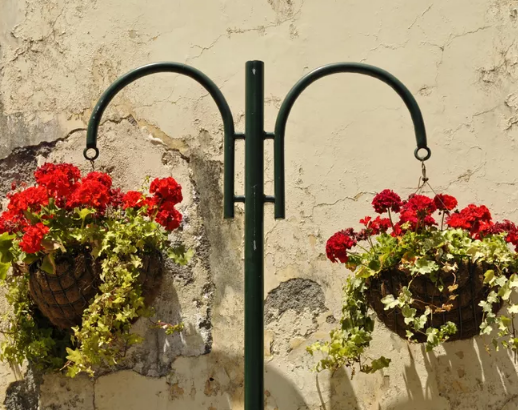
You may know that the more common name for these plants is geranium, but geranium is an annual plant that is grown north of its hardy zone, while true geranium is a hardy perennia. Geraniums’ bold textures, vibrant colors, and trailing habits make them ideal for hanging baskets. In order for the plant to remain flowering before frost, it is necessary to decapitate it.
- USDA Growing Areas: 10 to 11
- Color varieties: red, lavender, purple, pink, white
- Sun exposure: Full sun to partial shade
- Soil requirements: well-drained, slightly acidic, not too fertile
Petunia (Petunia x Hybrid)

Petunias have always been a classic favorite of hanging baskets, but some gardeners face the challenge of petal wilt in rainy and very wet weather. Try the thousand-flowered variety, which can bloom continuously without topping, or the multi-flowered variety, which can work in the hot and humid summer months. Petunias are most fragrant at night, so adding a white petunia breed to the Moon Garden would be more appealing.
- USDA Growing Areas: 9 to 11
- Color varieties: purple, lavender, yellow, blue magenta, maroon, pink, red, white, bicolor of a variety of shades and combinations
- Sun exposure: Plenty of sunlight
- Soil requirements: light, fertile, well-drained, slightly acidic
Portulaca (Portulaca grandiflora)
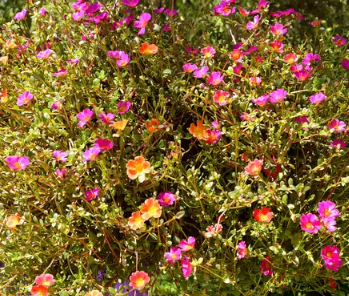
Keep purslane or moss roses in a place where you can get sunlight most of the day. When the plant is in the shade, its flowers close. Pairing moss roses with other heat-loving, drought-tolerant plants, such as spider grass, can provide color between flowering cycles.
- USDA Growing Areas: 2 to 11
- Color varieties: orange, white, rose, yellow, red
- Sun exposure: Plenty of sunlight
- Soil requirements: sandy, well-drained, resistant to moist to dry soil
Sweet Alyssum (Lobularia maritima)
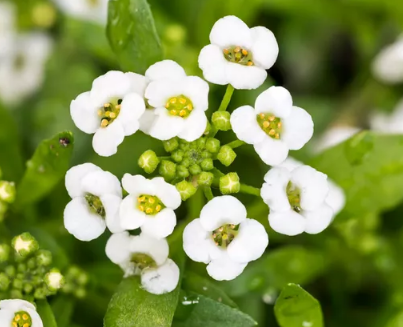
Sitting next to a sweet aromatherapy basket is like being in the middle of a fragrant cloud. These flowers have a strong honey scent that attracts butterflies and bees. As the seasons go on, the aromatherapy’s mesmerizing tailing habits can get unkempt, so don’t be afraid to rejuvenate it with a summer hairstyle.
- USDA Growing Areas: 7 to 11
- Color varieties: white, pink, purple
- Sun exposure: Full sun to partial shade
- Soil requirements: fertile, fertile, neutral pH
Lotus Vine (Lotus berthelotii)

Tell your gardening friends that you have a plant endemic to the Canary Islands in your garden and impress them. Lotus vine, also known as lotus vine or parrot vine, is decreasing in number in its native land, but is easily cultivated and propagated by seeds and cuttings. In fact, its greenish-gray needle-like leaves are as soft as feathers. When grown in a sunny place, flaming flowers of joy bloom throughout the season. The Jedi secret to growing this exotic plant is to provide it with daily moisture in a special cactus or orchid potted mixture, with good drainage.
- USDA Growing Areas: 10 to 12
- Color varieties: orange, red, yellow
- Sun exposure: Plenty of sunlight
- Soil Requirements: Lightweight, well-drained, or orchid potted mix